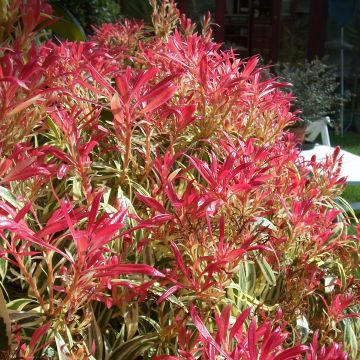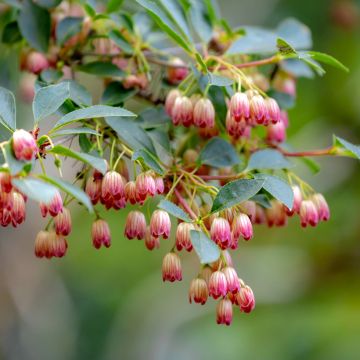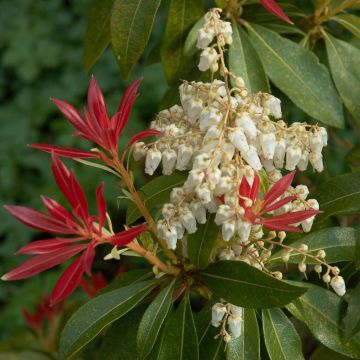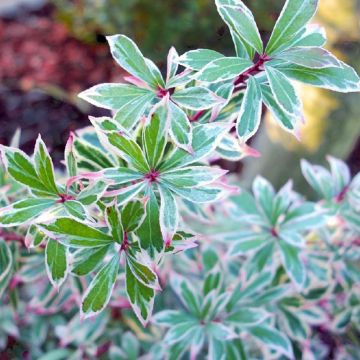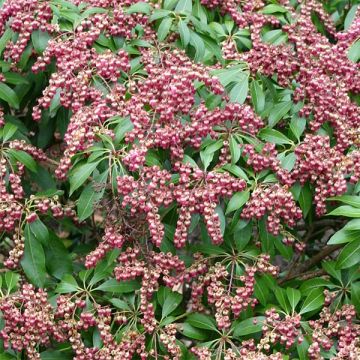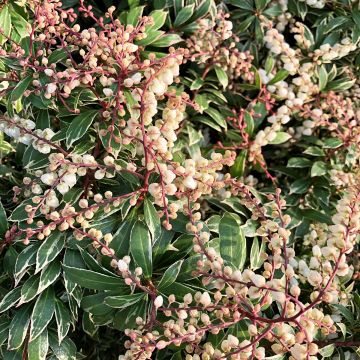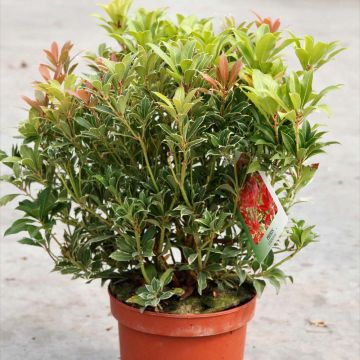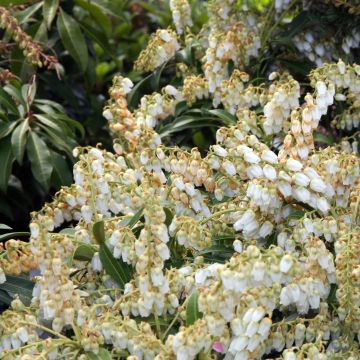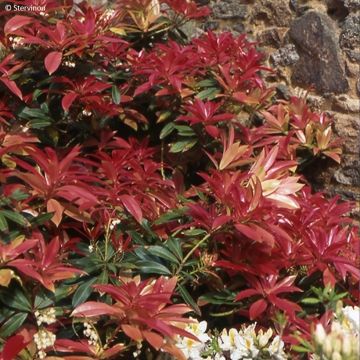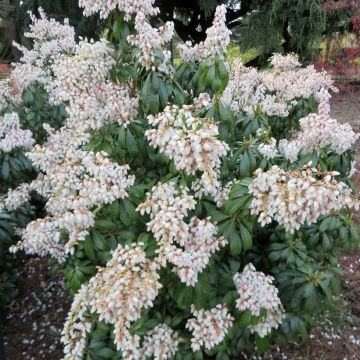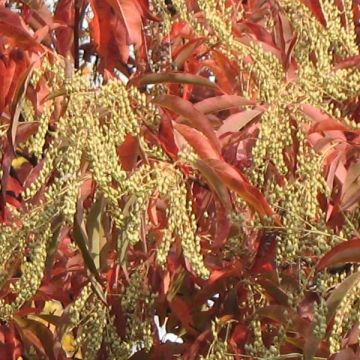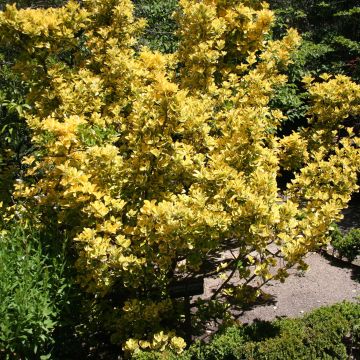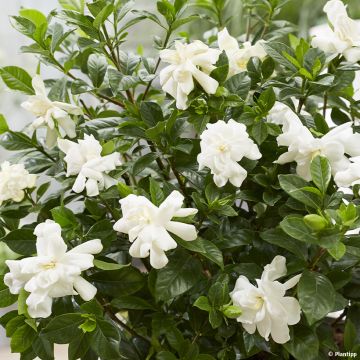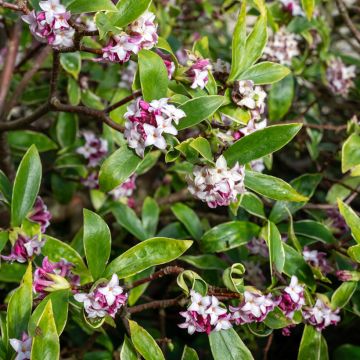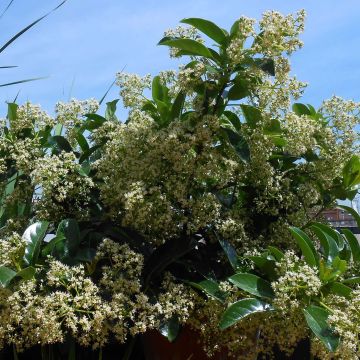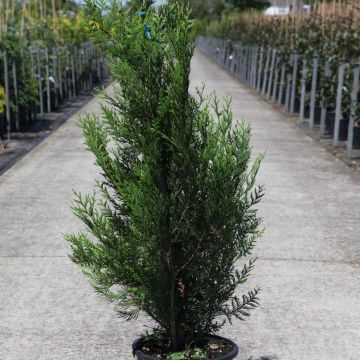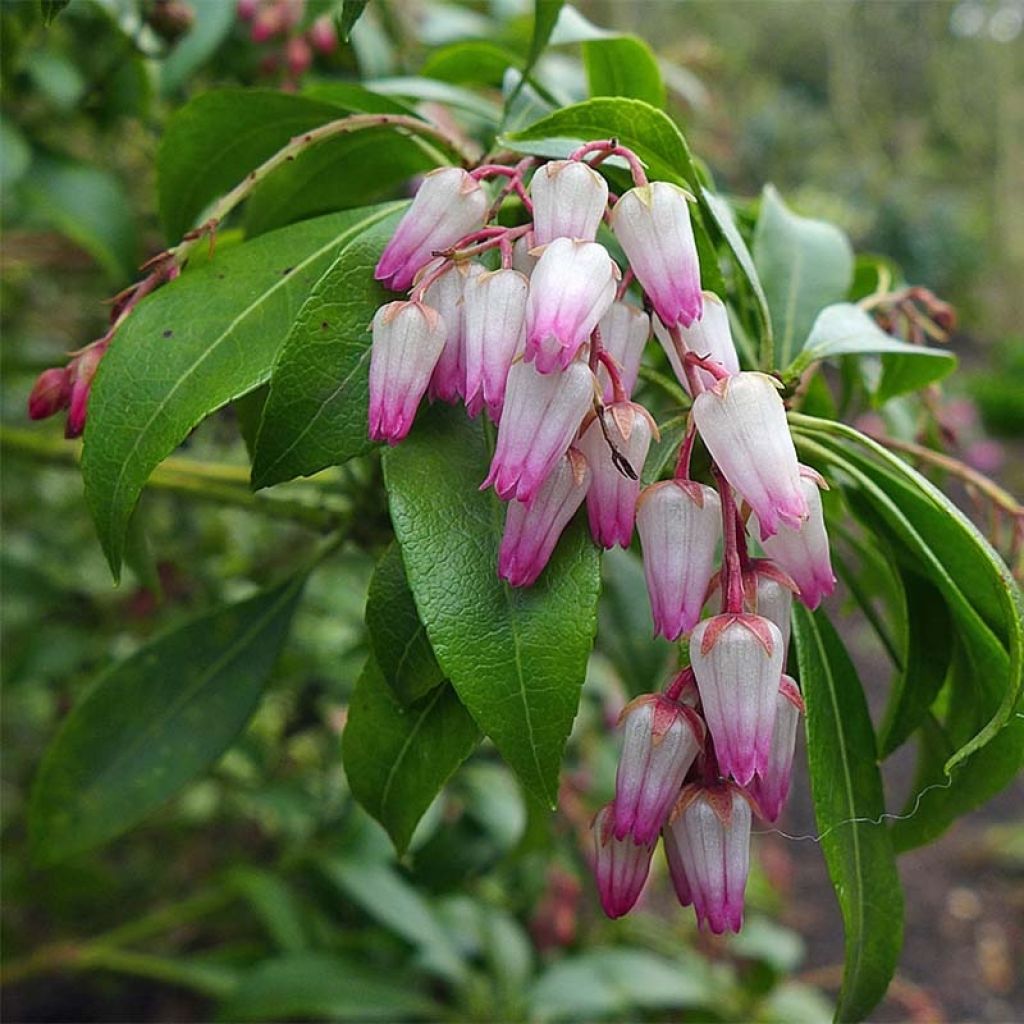

Pieris japonica Christmas Cheer - Japanese Andromeda
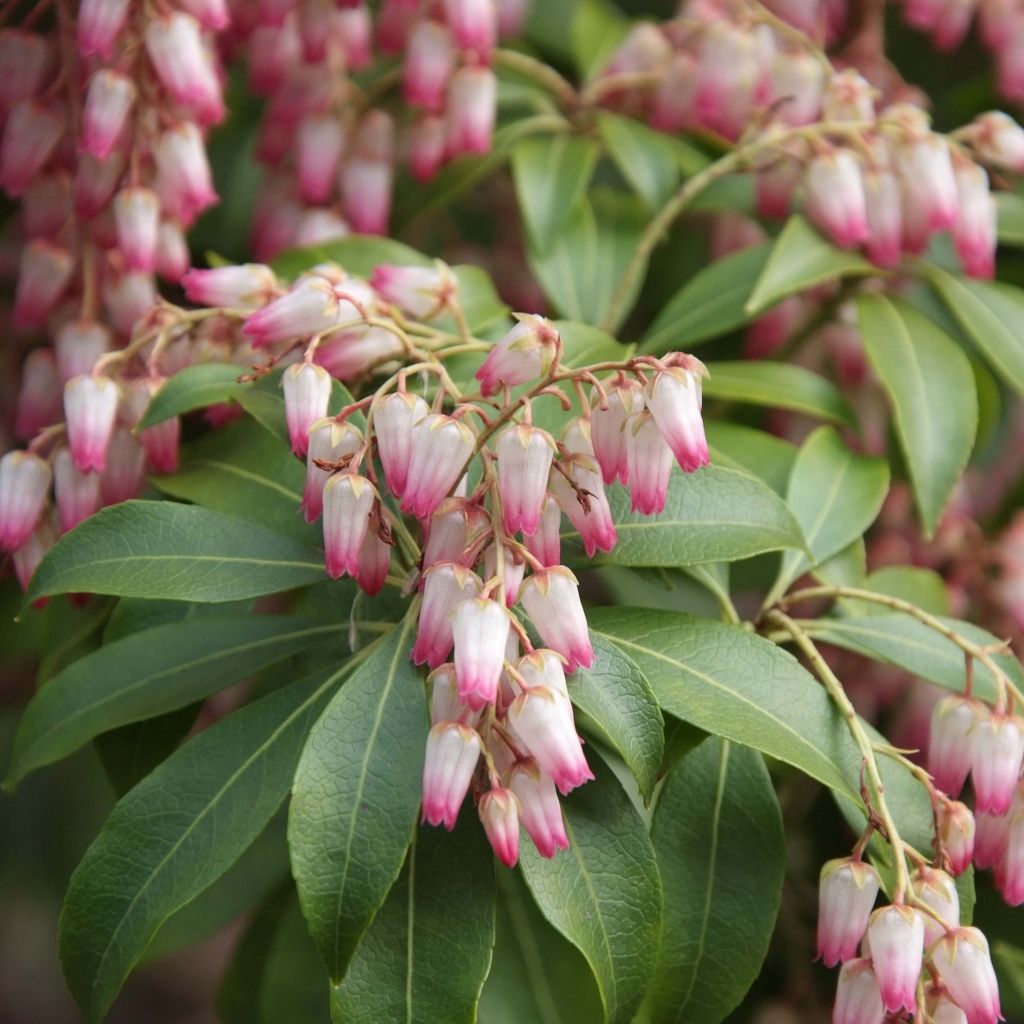

Pieris japonica Christmas Cheer - Japanese Andromeda
Pieris japonica Christmas Cheer - Japanese Andromeda
Pieris japonica Christmas Cheer
Japanese Andromeda, Japanese Pieris, Lily-of-the-Valley Bush
Special offer!
Receive a €20 voucher for any order over €90 (excluding delivery costs, credit notes, and plastic-free options)!
1- Add your favorite plants to your cart.
2- Once you have reached €90, confirm your order (you can even choose the delivery date!).
3- As soon as your order is shipped, you will receive an email containing your voucher code, valid for 3 months (90 days).
Your voucher is unique and can only be used once, for any order with a minimum value of €20, excluding delivery costs.
Can be combined with other current offers, non-divisible and non-refundable.
Why not try an alternative variety in stock?
View all →This plant carries a 24 months recovery warranty
More information
We guarantee the quality of our plants for a full growing cycle, and will replace at our expense any plant that fails to recover under normal climatic and planting conditions.
Would this plant suit my garden?
Set up your Plantfit profile →
Description
The Pieris japonica Christmas Cheer is an excellent variety of Japanese andromeda, both hardy and floriferous from a young age, and endowed with a very pleasantly bicoloured flowering, in dark carmine pink and white-cream. It is decorative all year round, with its deep pink floral buds that form from December, its wonderful flowering in early spring, its evergreen foliage that persists in winter, and finally for its supple and natural habit. Pieris is a bush that thrives in partial shade and acidophilous soil, which can be easily grown in the garden or in a container if these conditions are met.
The Pieris japonica, more commonly known as Japanese andromeda, is native to eastern China, Japan, and Taiwan. It belongs to the ericaceae family, and is a cousin of heathers and camellias with which it forms beautiful massifs. The 'Christmas Cheer' cultivar is a superb Japanese creation dating back to 1967. This shrub has a bushy habit, its growth is rather slow, and at maturity, after 10 years, it reaches about 1.50m (4 ft 11 in) in height with a 1m (3 ft 4 in) spread. It has beautiful evergreen foliage in winter, composed of long, glossy, lanceolate and pointed leaves, slightly dentate at the edges, measuring up to 10cm (3.9 in) long. The young shoots are reddish, then the leaves turn light green, and finally dark green. The clusters of floral buds, a dark old pink, appear in winter, enhancing the decorative effect of this Japanese andromeda during the dreary season. In April, it is covered with numerous upright clusters with trailing tips, measuring 10 to 15cm (3.9 to 5.9 in) long, composed of small urn-shaped flowers, ranging from carmine pink to white-cream, resembling lily-of-the-valley flowers. The flowers, which have a sweet honey fragrance, are very attractive to bees.
With its undeniable charm, personality, and extremely decorative appearance throughout the seasons, this Japanese andromeda 'Christmas Cheer' has found its place under the canopy of tall trees, on the edge of partially shaded shrubs, as a low hedge, in a shaded rockery, and especially alongside other acid-loving plants such as camellias, rhododendrons, heathers, mollis or Japanese azaleas. With its generous flowering, it will make a sensation when associated with spring bulbs (daffodils, early tulips), hellebores, and primroses. It also makes a beautiful specimen for decorating a terrace or balcony, planted in a carefully chosen large pot. Finally, the Pieris has its rightful place in a Japanese-style garden!
Report an error about the product description
Pieris japonica Christmas Cheer - Japanese Andromeda in pictures
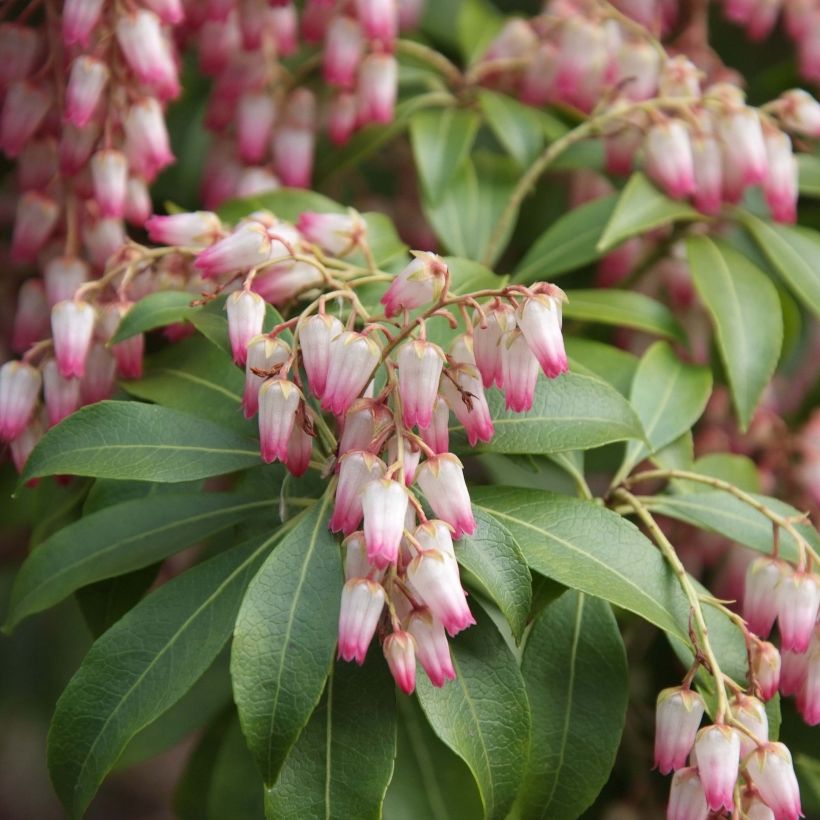

Plant habit
Flowering
Foliage
Botanical data
Pieris
japonica
Christmas Cheer
Ericaceae
Japanese Andromeda, Japanese Pieris, Lily-of-the-Valley Bush
Cultivar or hybrid
Other Pieris
View all →Planting and care
The Pieris japonica 'Christmas Cheer' appreciates a semi-shaded exposure or gentle sun, as well as an acidic, fresh, light, humus-rich, and well-drained soil. It is hardy, tolerating temperatures as low as -15°C (5 °F) in perfectly drained soil, but its young shoots can be damaged by late frost. It is advisable to plant it in a sheltered position from cold and drying winter winds. Install a thick mulch at its base in autumn, in harsh climates or in situations exposed to winter winds. A thick layer of fern fronds, dead leaves, and pine needles would be ideal. If its young foliage has been damaged by frost, it will be pruned to stimulate the growth of new shoots. Appreciating a good level of humidity, it prefers consistently moist soil but not the stagnant moisture of clay soils. To prevent soil drying out, regular watering with non-calcareous water is necessary, especially in the first year after planting and during the summer. Planting is done in spring or autumn, in a mixture of garden soil, peat, and heath soil. In spring, it is recommended to surface-dress with heath soil and compost around its roots and possibly provide a basal fertilizer in the form of a handful of dried blood. Take care to give enough space to this Pieris japonica to ensure its proper development, respecting a planting distance of 0.70 cm (0.3 in) to 1 m (3 ft 4 in) around its base. After flowering, remove faded flowers to avoid unnecessarily exhausting the plant through seed production. Also, lightly prune bare branches that compromise the bushy habit of the Pieris japonica.
Planting period
Intended location
Care
This item has not been reviewed yet - be the first to leave a review about it.
Similar products
Haven't found what you were looking for?
Hardiness is the lowest winter temperature a plant can endure without suffering serious damage or even dying. However, hardiness is affected by location (a sheltered area, such as a patio), protection (winter cover) and soil type (hardiness is improved by well-drained soil).

Photo Sharing Terms & Conditions
In order to encourage gardeners to interact and share their experiences, Promesse de fleurs offers various media enabling content to be uploaded onto its Site - in particular via the ‘Photo sharing’ module.
The User agrees to refrain from:
- Posting any content that is illegal, prejudicial, insulting, racist, inciteful to hatred, revisionist, contrary to public decency, that infringes on privacy or on the privacy rights of third parties, in particular the publicity rights of persons and goods, intellectual property rights, or the right to privacy.
- Submitting content on behalf of a third party;
- Impersonate the identity of a third party and/or publish any personal information about a third party;
In general, the User undertakes to refrain from any unethical behaviour.
All Content (in particular text, comments, files, images, photos, videos, creative works, etc.), which may be subject to property or intellectual property rights, image or other private rights, shall remain the property of the User, subject to the limited rights granted by the terms of the licence granted by Promesse de fleurs as stated below. Users are at liberty to publish or not to publish such Content on the Site, notably via the ‘Photo Sharing’ facility, and accept that this Content shall be made public and freely accessible, notably on the Internet.
Users further acknowledge, undertake to have ,and guarantee that they hold all necessary rights and permissions to publish such material on the Site, in particular with regard to the legislation in force pertaining to any privacy, property, intellectual property, image, or contractual rights, or rights of any other nature. By publishing such Content on the Site, Users acknowledge accepting full liability as publishers of the Content within the meaning of the law, and grant Promesse de fleurs, free of charge, an inclusive, worldwide licence for the said Content for the entire duration of its publication, including all reproduction, representation, up/downloading, displaying, performing, transmission, and storage rights.
Users also grant permission for their name to be linked to the Content and accept that this link may not always be made available.
By engaging in posting material, Users consent to their Content becoming automatically accessible on the Internet, in particular on other sites and/or blogs and/or web pages of the Promesse de fleurs site, including in particular social pages and the Promesse de fleurs catalogue.
Users may secure the removal of entrusted content free of charge by issuing a simple request via our contact form.
The flowering period indicated on our website applies to countries and regions located in USDA zone 8 (France, the United Kingdom, Ireland, the Netherlands, etc.)
It will vary according to where you live:
- In zones 9 to 10 (Italy, Spain, Greece, etc.), flowering will occur about 2 to 4 weeks earlier.
- In zones 6 to 7 (Germany, Poland, Slovenia, and lower mountainous regions), flowering will be delayed by 2 to 3 weeks.
- In zone 5 (Central Europe, Scandinavia), blooming will be delayed by 3 to 5 weeks.
In temperate climates, pruning of spring-flowering shrubs (forsythia, spireas, etc.) should be done just after flowering.
Pruning of summer-flowering shrubs (Indian Lilac, Perovskia, etc.) can be done in winter or spring.
In cold regions as well as with frost-sensitive plants, avoid pruning too early when severe frosts may still occur.
The planting period indicated on our website applies to countries and regions located in USDA zone 8 (France, United Kingdom, Ireland, Netherlands).
It will vary according to where you live:
- In Mediterranean zones (Marseille, Madrid, Milan, etc.), autumn and winter are the best planting periods.
- In continental zones (Strasbourg, Munich, Vienna, etc.), delay planting by 2 to 3 weeks in spring and bring it forward by 2 to 4 weeks in autumn.
- In mountainous regions (the Alps, Pyrenees, Carpathians, etc.), it is best to plant in late spring (May-June) or late summer (August-September).
The harvesting period indicated on our website applies to countries and regions in USDA zone 8 (France, England, Ireland, the Netherlands).
In colder areas (Scandinavia, Poland, Austria...) fruit and vegetable harvests are likely to be delayed by 3-4 weeks.
In warmer areas (Italy, Spain, Greece, etc.), harvesting will probably take place earlier, depending on weather conditions.
The sowing periods indicated on our website apply to countries and regions within USDA Zone 8 (France, UK, Ireland, Netherlands).
In colder areas (Scandinavia, Poland, Austria...), delay any outdoor sowing by 3-4 weeks, or sow under glass.
In warmer climes (Italy, Spain, Greece, etc.), bring outdoor sowing forward by a few weeks.































